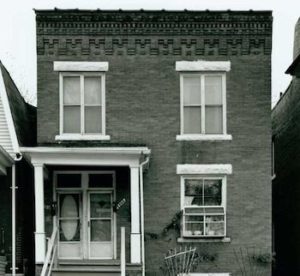
The Shelley House is celebrated on this date for its role in the U. S. Supreme Court landmark 1948 case of Shelley v. Kraemer, which strengthened equal protection in housing.
This two-story masonry home, built in St. Louis, Missouri 1906, is one of many pieces of African American heritage. The house was at the center of restrictive racial covenants in American housing. On that date, the United States Supreme Court rendered its landmark decision in Shelley v. Kraemer, holding, by a vote of 6 to 0 (with three judges not sitting), that courts cannot enforce racially restrictive covenants since this would constitute state action denying due process of law in violation of the 14th Amendment to the Constitution.
In 1930, J. D. Shelley, his wife, and their six children migrated to St. Louis from Mississippi to escape the pervasive racial oppression of the South. For several years, they lived with relatives and then in rental properties. When they tried to buy a home, they found that many buildings in St. Louis were covered by racially restrictive covenants, by which the building owners agreed not to sell to anyone other than a Caucasian. The Shelleys directly challenged this discriminatory practice by purchasing such a building at 4600 Labadie Avenue from an owner who agreed not to enforce the racial covenant.
Louis D. Kraemer, owner of another property on Labadie covered by restrictive covenants, sued in the St. Louis Circuit (State) Court to enforce the restrictive covenant and prevent the Shelleys from acquiring title to the building. The trial court ruled in the Shelleys' favor in November of 1945. Still, when Kraemer appealed, the Missouri Supreme Court, on December 9, 1946, reversed the trial court's decision and ordered that the racial covenant be enforced. The Shelleys then appealed to the United States Supreme Court.
Because the J. D. Shelley family decided to fight for the right to live in their chosen home, the United States Supreme Court addressed the issue of restrictive racial covenants in housing in the landmark 1948 case of Shelley v. Kraemer. Although the case did not outlaw covenants (only a state's enforcement of the practice), in Shelley v. Kraemer, the Supreme Court strongly reinforced the 14th Amendment's guarantee of equal protection under the law, which includes rights to acquire, enjoy, own, and dispose of property. The Shelley case also underscores a Black family's struggle for justice that profoundly affected American society.